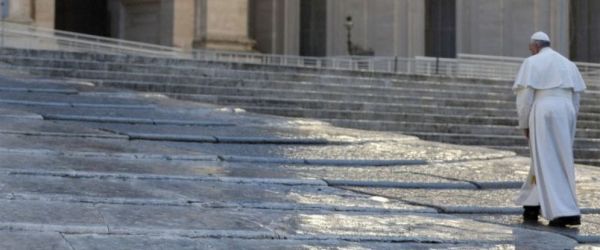Miracles still exist today. But to enable the Lord to perform them there is a need for courageous prayer, capable of overcoming that "something of unbelief" that dwells in the heart of every man, even if he is a man of faith. A prayer especially for those who suffer from wars, persecutions and every other drama that shakes society today. But prayer must "put flesh on the fire", that is, involve our person and commit our whole life, to overcome unbelief. This was the recommendation given by Pope Francis to those who attended the Mass celebrated this morning, Monday 20 May, in the chapel of the Domus Sanctae Marthae.
In his homily, the Pontiff reflected on unbelief starting from the account in Mark's Gospel (9:14-29) about a young man possessed by the evil spirit and delivered by Christ. "It is not the first time," said the Holy Father, "that Jesus complains about unbelief: O unbelieving generations! So many times he said it'; and he suffered greatly from this unbelief towards his words, his message. "They loved him, the crowds went to greet him. They loved him but to a certain extent. They were not risking too much in their faith towards him. They were not risking. And Jesus suffered for that, didn't he? It is powerful what he says today: O unbelieving generation, how long shall I be with you? Until when shall I endure you?".
The Pope then noted that Jesus is serious in his rebuke. Indeed, he addresses the disciples firmly and asks them to bring the possessed young man before him. "He takes things into his own hands" and when "Jesus takes things into his own hands, they go well". But how does one get the Lord to take things into his hands? Of course it is not easy, precisely because unbelief comes into play. "But why this unbelief?" the Pope wondered again. "Everyone saw that Jesus did miracles, so many beautiful things. Jesus' words were so beautiful and they reached the heart'. And it is indeed a question of the heart: 'I believe,' said the bishop of Rome, 'that it is precisely the heart that does not open, the closed heart, the heart that wants to have everything under control'. We are 'afraid to fail'. The Pontiff recalled in this regard what happened on Resurrection Sunday, 'when Jesus comes among his disciples in the cenacle. Luke says: There was so much joy that they could not believe. They were afraid that this joy was a dream, that it was a fantasy, that it was not Jesus...'.
Returning to the Gospel episode, the Holy Father reproposed the question of the disciples who had not been able to drive the evil spirit away from the young man: "But why could we not drive it out? This kind of demons, Jesus explained, cannot be driven out in any way except by prayer". And the boy's father "said: I believe Lord, help my unbelief". His was "a strong prayer; and this prayer, humble and strong, enables Jesus to perform the miracle. The prayer to ask for an extraordinary action,' the Pontiff explained, 'must be a prayer that involves all of us, as if we were committing our whole life to it. In prayer we must put meat on the fire'.
The Pontiff then recounted an episode that happened in Argentina: "I remember something that happened three years ago in the sanctuary of Luján. A seven-year-old girl had fallen ill, but the doctors could not find a solution. She was getting worse and worse, until one evening, the doctors said there was nothing more they could do and that she only had a few hours to live. "The father, who was an electrician, a man of faith, became like mad. And driven by that madness he took the bus and went to the sanctuary of Luján, two and a half hours by bus, seventy kilometres away. He arrived at nine in the evening and found everything closed. And he began to pray with his hands clinging to the iron gate. He was praying and crying. So he stayed the whole night. This man was fighting with God. He was really struggling with God for the healing of his maiden. Then at six in the morning he went to the terminal and took the bus. He arrived at the hospital at nine o'clock, more or less. He found his wife crying and thought the worst: what happened? I don't understand. What happened? The doctors came, his wife told him, and they said the fever is gone, she's breathing well, there's nothing.... They will only keep her for two more days. But they don't understand what has happened. And this,' the Pope commented, 'still happens. There are miracles. But prayer is needed! A courageous prayer, which struggles to reach that miracle, not those prayers out of courtesy: Ah, I will pray for you! Then a Pater Noster, an Ave Maria and I forget. No! It takes a courageous prayer, like that of Abraham who wrestled with the Lord to save the city; like that of Moses who prayed with his hands up and tired praying to the Lord; like that of so many people who have faith and with faith pray, pray".
Prayer works miracles, "but," Pope Francis concluded, "we must believe it. I think we can make a beautiful prayer, not a prayer out of courtesy, but a prayer with the heart, and say to Him today throughout the day: I believe Lord! Help my unbelief. We all have unbelief in our hearts. Let us say to the Lord: I believe, I believe! You can! Help my unbelief. And when we are asked to pray for so many people who suffer in wars, in their plight as refugees, in all these dramas we pray, but with our hearts, and we say: Lord, do. I believe, Lord. But help my unbelief".
[Pope Francis, St. Martha, in L'Osservatore Romano 20-21/05/2013]












